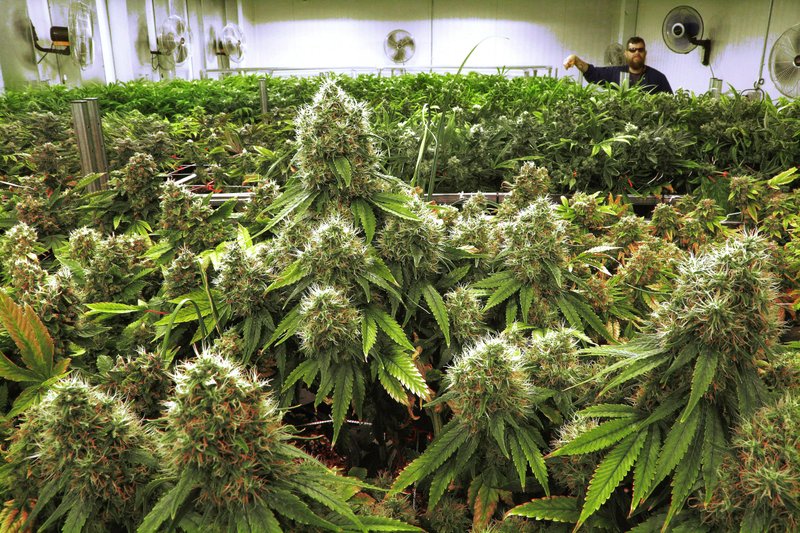State attorneys should not be allowed to submit a secret letter in the dispute over Arkansas' medical marijuana program, companies on both sides of the litigation said Wednesday.
Attorney General Leslie Rutledge asked the Arkansas Supreme Court in a Tuesday motion to let her file a document to the court under seal "for reasons that will be apparent on the face of the tendered letter."
Her request came less than 48 hours before the parties are scheduled to take part in today's oral arguments before the high court. Justices will hear arguments in an appeal of a lower-court ruling that rejected the process under which a state commission approved permits to grow the drug.
In an unusual order, the court on Wednesday allowed the letter to be distributed to the counsel of record for each party in the case, but it barred those attorneys from sharing the letter with anyone else, even their own clients.
The court's order was entered at 10:46 a.m. Wednesday, and it gave attorneys until 4:30 p.m. to argue whether the document should remain secret.
Naturalis Health, the lead plaintiff in the case, said in its response that the document should be made public.
[DOCUMENTS: Read complaints filed + winning applications from top five growers]
"In the interests of transparency and full disclosure, Naturalis believes the document tendered by the Attorney General's Office should be filed of record and subject to inspection by the general public," an attorney for the company wrote.
The court, as of Wednesday evening, had not ruled on the matter.
Naturalis, which applied unsuccessfully for one of the state's first medical marijuana growing permits, sued the state in March, alleging flaws in the process for ranking the 95 cultivation license applications.
Pulaski County Circuit Judge Wendell Griffen sided with Naturalis, halting the process for licensing the state's first cannabis growers and sellers.
The case made its way to the Arkansas Supreme Court after Rutledge appealed Griffen's decision. Eleven other medical marijuana companies -- four that scored high enough to receive growing permits and seven that scored outside the top five -- intervened in Naturalis' suit.
Four of the five companies that stood to receive a cannabis cultivation license have defended the licensing process alongside the attorney general's office, but their arguments have at times been at odds with the pleadings of state attorneys.
So it was on Wednesday when three of those companies, in a joint response, opposed Rutledge's request to submit the letter under seal. Natural State Wellness Enterprises, Delta Medical Cannabis Co. and Bold Team argued that the time to submit new records has passed.
"Offering information outside of the record to the Court for its consideration is improper," the response reads. The response came before the court's Wednesday morning order, but the companies didn't submit a supplemental response afterward.
One other company, Natural State Agronomics, which unsuccessfully applied for a growing permit, responded to the state's motion, but its response was sealed, a court clerk said Wednesday afternoon.
Joshua Silverstein, a professor at the University of Arkansas at Little Rock William H. Bowen School of Law, said that proceedings like these are uncommon but not unheard of. Withholding sealed records from clients occurs most frequently in antitrust litigation that pits competitors against one another. Information that could give one company a competitive advantage is often privileged, Silverstein said.
However, this case, he said, is different because the state is the moving party, not a "competitor."
Ever since the Arkansas Medical Marijuana Commission announced the top five growing applicants, unsubstantiated rumors about commissioners, applicants and state regulators have bounced around the medical marijuana community.
On Tuesday and Wednesday, speculation about the contents of the attorney general's letter swirled, but attorneys in the industry were reluctant to speak on the record.
Oral arguments are scheduled for this morning, and the court is expected to rule on Griffen's decision by the end of the month. At that point, officials expect to have a clearer picture of when the drug, which must be grown in the state, will be available in Arkansas. Voters legalized medical marijuana in a constitutional amendment approved in November 2016, and the state has been working since then to license growers and dispensaries.
The state Department of Health has approved more than 4,000 applications for registry ID cards that would allow patients with one of 18 qualifying conditions to purchase the drug, which will be sold at 32 dispensaries around the state.
A Section on 06/07/2018

